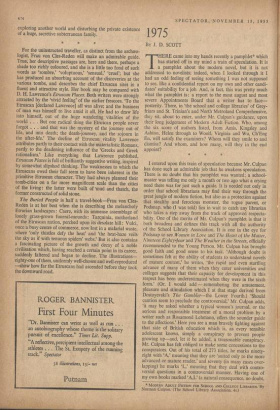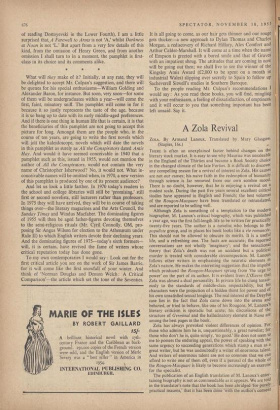1975
By J. D. SCOTT THERE came into my hands recently a pamphlet* which has started off in my mind a train of speculation. It is a pamphlet about the modern novel, but it is not addressed to novelists; indeed, when I looked through it I had an odd feeling of seeing something I was not supposed to see, like a confidential report on my own and other candi- dates' suitability for a job. And, in fact, this was pretty much what the pamphlet is : a report to the most august and most severe Appointments Board that a writer has to face— posterity. There, in 'the school and college libraries' of Grey- friars and St. Trinian's and North Metroland Comprehensive, they sit, about to enter, under Mr. Culpan's guidance, upon their long judgement of Modern Adult Fiction. Who, among the six score of authors listed, from Amis. Kingsley and Ashton, Helen through to Woolf, Virginia and Wu, Ch'Eng En, will satisfy the examiners? Whom will they smile to and dismiss? And whom, and how many, will they in the end appoint?
* * * I entered upon this train of speculation because Mr. Culpan has done such an admirable job that he awakens speculation. There is no doubt that his pamphlet was wanted; a school- master was telling me only a month or two ago what a crying need there was for just such a guide. It is needed not only in order that school librarians may find their way through the great jungle of modern fiction, but also as a protection against that stealthy and ferocious monster, the rogue parent, or Podsnap, who (I was told) lies in wait to catch any librarian who takes a step away from the track of approved respecta- bility. One of the merits of Mr. Culpan's pamphlet is that it both broadens and defines this track with all the authority of the School Library Association. It is one in the eye for Podsnap to see Women in Love and The Heart of the Matter, Nineteen Eighty-four and The Weather in the Streets, officially recommended to the Young Person. Mr. Culpan has brought good faith and good sense to his task. 'Although doubt is sometimes felt at the ability of students to understand novels of mature content,' he writes, 'the rapid and even startling advance of many of them when they enter universities and colleges suggests that their capacity for development in this respect has been underestimated when they were in the sixth form.' (Or, I would add — remembering the amusement, pleasure and stimulation which I at that stage derived from Dostoyevski's The Gambler—the Lower Fourth.) 'Should caution seem to preclude the controversial,' Mr. Culpan adds, 'it may be asked whether a typical women's journal, or the serious and responsible treatment of a moral problem by a writer such as Rosamond Lehmann, offers the sounder guide to the affections.' Here you see a man bravely fighting against that side of British education which is, as every sensible adolescent knows, simply a conspiracy to prevent people growing up—and, let it be added, a treasonable conspiracy. Mr. Culpan has felt obliged to make some concessions to the conspirators. Out of his total of 273 titles, he marks ninety- eight with 'A,' meaning that they are 'suited only to the more advanced or mature reader,' and seventy (in many cases over- lapping) he marks `L,' meaning that they deal with contro- versial questions in a controversial manner. Having one of my own books marked `A,L' (a natural consequence, no doubt, * MODERN ADULT FICTION FOR SCHOOL AND COLLEGE LIBRARIES. By Norman Culpan. (The School Library Association. 4s.) of reading Dostoyevski in the Lower Fourth), I am a little surprised that, A Farewell to Arms is not 'A,' whilst Darkness at Noon is not 'L.' But apart from a very few details of this kind, from the omission of Henry Green, and from another omission I shall turn to in a moment, the pamphlet is first- class in its choice and its comments alike.
What will they make of it? Initially, at any rate, they will be delighted to accept Mr. Culpan's suggestion, and there will be queues for his special enthusiasms—William Golding and Alexander Baron, for instance. But soon, very soon—for some of them will be undergraduates within a year—will come the first, faint, minatory sniff. The pamphlet will come, in for it because it so justly represents the taste of the age, because it is so bang up to date with its early middle-aged preferences. And if there is one thing in humatt life that is certain, it is that the beneficiaries of this pamphlet are not going to accept this picture for long. Amongst them are the people who, in the course of ten years, are going to write the first novels which will jolt the kaleidoscope, novels which will date the novels in this pamphlet as surely as All the Conspirators dated Antic Hay. And would it have seemed conceivable in 1940 that a pamphlet such as this, issued in 1955, would not mention the author of All the Conspirators, would not contain the very name of Christopher Isherwood? No, it would not. What in- conceivable names will be omitted when, in 1970, a new version of this pamphlet is produced by one of its present audience?
And let us look a little farther. In 1970 today's readers in the school and college libraries will still be 'promising,' still first or second novelists, still lecturers rather than professors. In 1975 they will have arrived, they will be in course of taking things over—the literary magazines and the Arts Council, the Sunday Times and Windus Macfaber. The dominating figures of 1955 will then be aged father-figures devoting themselves to the semi-religious rituals (Mr. Cyril Connolly, OM, pro- posing Sir Angus Wilson for election to the Athenxum under Rule II) to which English writers devote their declining years. And the dominating figures of I975—today's sixth formers— will, it is certain, have revived the fame of writers whose critical reputation today has done gone.
To my own contemporaries I would say : Look out for the first critical article you see on the work of Sir James Barrie, for it will come like the first snowfall of your winter. And think of 'Norman Douglas and Denton Welch : A Critical Comparison'—the article which set the tone of the Seventies. It is all going to come, as our hair gets thinner and our rouge gets thicker—a new approach to Dylan Thomas and Charles Morgan, a rediscovery of Richard Hillary, Alex Comfort and Arthur Calder-Marshall. It will come at a time when the name of Empscin is greeted with a bored smile and that of Graves with an impatient shrug. The attitudes that are coming in now will be going out then; we shall live to see the winner of the Kingsley Amis Award (£2,000 to be spent on a month in industrial Wales) slipping over secretly to Spain to follow up Sacheverell Sitwell's studies in Southern Baroque.
To the people reading Mr. Culpan's recommendations I would say : As you read these books, you will find, mingling with your enthusiasm, a feeling of dissatisfaction, of emptiness, and it will occur to you that something important has been left unsaid. Say it.











































































 Previous page
Previous page